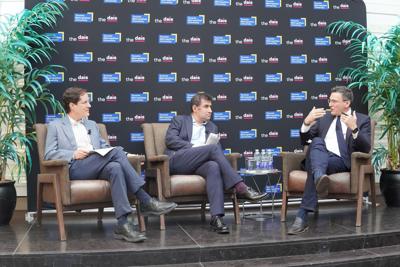Evan Solomon’s job title is Canada’s first minister of artificial intelligence, but his biggest job is focusing on the political and emotional intelligence required for technology in any democracy.
Canadians don’t want to miss out, but they are also deeply anxious about the power of AI and machine learning to mess with their lives. Solomon’s mission is to strike a balance between those economic and democratic opportunities and imperatives.
“There’s a political realignment going on that’s dramatic,” he told the Democracy Forum that I hosted Friday at ������������Metropolitan University. “There’s a technological revolution, and you’re very much part of it — and they’re happening simultaneously. We are in a specific moment and the moment demands action.”
I’d asked about the AI fears expressed by a massive majority of Canadians in recent polling — about losing privacy, losing jobs, even losing the ability to think. People strongly favour regulation, but the governing Liberals are walking a fine line.
“When you see polls about jobs, and about regulation, they reflect some anxieties about this,” Solomon mused. “Remember, these tools have to be in service of Canadian values and Canadian citizens. We’re not building tools so we can serve tools. We’re building tools so they can serve us. And we need the regulatory environment to do that.”
That means moving forward on building a Canadian digital backbone, while rewriting the regulatory framework. But it won’t always be in a straight line, given the back and forth of the previous government that failed to pass legislation before the last election.
Elements of the previous AI proposal were “a little controversial” and require a rethink. “We will not likely include that, but we will and are looking at a couple of things,” he said.
“The legislative piece is big,” he added teasingly, promising “big announcements on quantum coming … creating a digital infrastructure as part of our national projects, which means sovereign data centres and a sovereign cloud” to safeguard information on Canadian territory.
A legislative priority for his ministry will also be ferreting out “deepfakes with a focus on kids,” so that they can be wiped clean off the internet, not merely buried by de-indexing them from search engines, added Solomon, who is also MP for ������������Centre.
The minister’s challenge is to stickhandle past the obstacles while keeping his head up for passing opportunities. Canada was an early adopter and world leader in AI creation and research, but it is lagging in AI adaptation and development as foreign investors harvest the rewards.
Hence the search for a “balance with innovation and regulation — we’ve got to keep safe, but we’ve got to be open to the world.”
That means creating the conditions for innovation, while building a framework for trust and confidence, he argues.
“We need trust. Technology moves at the speed of innovation, and trust moves at the speed of culture.”
My co-host Hossein Rahnama, a professor of AI and human creativity at TMU — who also teaches at the MIT Media Lab — reminded the minister of Canada’s storied history of disruptive technology led by the likes of BlackBerry, Bombardier and Nortel. But Canada can’t do it alone, so how will he finesse the public’s opposition to America with perennial opportunities across the border?
“We are going through a political realignment, obviously,” Solomon said. “Sovereignty doesn’t mean solitude. The United States is our major trading partner.”
On the one hand, Canada must build its own data centres to keep our data safe from foreign control. But it cannot close its eyes to American AI.
“How do you balance that, because data flows across borders? You don’t want to constrict innovation, but you still want to have that insurance policy … to make sure that in an emergency situation, or if things change, Canadians still have control of our data.”
The challenge is that AI and the internet are changing at warp speed. While the internet has made information abundant, AI has made intelligence abundant, Solomon argued — which places a premium on critical thinking by humans.
How will AI and machine learning change human learning on campus? When introducing the minister to the TMU Democracy Forum, I’d tried a thought experiment by outsourcing the task to chatGPT — which correctly described Solomon’s past life as a television journalist, but was utterly oblivious to his new day job as minister of artificial intelligence.
That’s a bit of a blind spot for an AI machine. I took over the rest of the introduction, but it set the stage for my question about the unpredictability of predictive AI.
“What matters in education is critical thinking,” said Solomon, who has two university-age children. “This technology has to be designed by humans for humans, and the learning (must be) reinforcing our values … and they require these institutions of democracy,” he told our TMU audience.
“Remember, before we build the technology and the sovereign AI plan, we’ve got to build the human democracy plan, and that’s important — that’s one of the reasons I came here.”
(Disclosure: I’m a senior fellow at the Dais at ������������Metropolitan University, which hosts the TMU Democracy Forum.)
Error! Sorry, there was an error processing your request.
There was a problem with the recaptcha. Please try again.
You may unsubscribe at any time. By signing up, you agree to our and . This site is protected by reCAPTCHA and the Google and apply.
Want more of the latest from us? Sign up for more at our newsletter page.


























To join the conversation set a first and last name in your user profile.
Sign in or register for free to join the Conversation